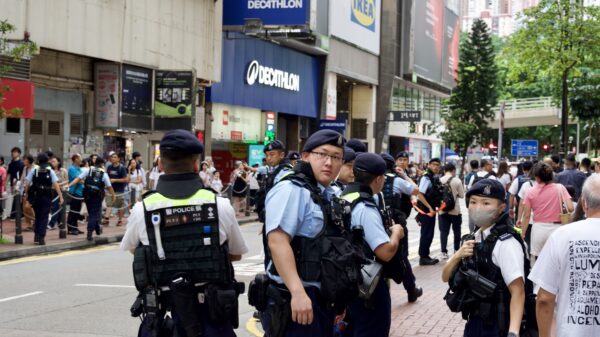From the 21st to the 23rd of May, King’s College London (KCL) hosted the second London Defence Conference (LDC), Roar sent a team of writers to cover the 3 days.
Conference Day 1 – by Angelika Etherington-Smith and Leah Napier-Raikes
The first day was designated the “Future Leader’s Day”, focusing on the presence and future of security in terms of strategy, investment into different branches of the armed forces, foreign policy, and the relationship of young people with a range of security topics. Due to the subject matter discussed, most sessions took place under the Chatham House Rule, with some being off the record entirely.
The day started with an off-the-record discussion between 2 ex-Defense Secretaries, Sir Michael Fallon and Lord George Robertson. The gentlemen discussed their respective times in office and the evolution of British security.
A notable session that was under neither limit is the panel on “Youth Perspectives on Countering Terrorism” run by three people from the Resilience in Unity Project. For a conference focused on security, it was informative to see just how much value the young presenters put on the lack of mental health support for those suffering “invisible” consequences after a terror attack or a range of resources supporting those wishing to leave extremist environments.
These three people were Alicia Taylor, Travis D. Frain OBE and Sohail Ahmed. Taylor shared her harrowing experience as a survivor of the 2019 Manchester attack at an Ariana Grande concert, highlighting the severe lack of support for both herself and her mother, who was left partially deaf and deeply traumatised. Travis D. Frain OBE from the University of Central Lancashire recounted his ordeal during the Westminster attack, emphasising the inadequate mental health support he received, having waited 13 weeks for help, only to receive trivial advice. Ahmed shared his struggles with isolation caused by his parents’ radicalization and his own sexuality. Although he once contemplated terrorism, the support of friends helped him reject that path, however, he does attribute this change of heart to his own. His story, along with others, underscores the critical need for long-term mental health support for terrorism victims.
Following the morning sessions, King’s PhD candidates presented their projects on topics ranging from “Outsourcing Artificial Intelligence: US Intelligence Community” to “How best to steer HMS Intelligence” and “Is the British Armed Forces having an identity crisis?”.
In the afternoon, there were 8 sessions that attendees were invited to based on their expressed interests in specific fields of security. The sessions included discussions on maritime, cyber, land and space sectors of British security, followed by a session focused on a geographical conflict region – Iran and Middle East, Ukraine, Africa and the Indo-Pacific region.
The day ended with a talk about sanctions, exploring their utility and effectiveness in a globalised world, followed by a brief, but lively networking session amongst the diverse attendees.
This year, the attendees to the first day of the conference ranged from academics and professionals with decades in varied security fields, to staff from BAE and MBDA, to Englesberg Applied History Programme Fellows. Naturally, the hall bustled with keen postgraduate students – some from King’s and some coming from the Universities of Reading and Bath.
Conference Day 2 – Covered by Anna Orwin
Succeeding the inaugural Future Leaders’ Day, May 22nd marked the full opening of the London Defence Conference. This year’s conference focussed on the theme of deterrence which was noted by speakers as the most important aspect of contemporary defence. Discussions mainly addressed two questions: who needs deterring, and how to deter.
The first two panels utilised history as a method for deducing who needs deterring. Unsurprisingly, the significant threat posed by Russia and China was highlighted, especially within the context of their growing alliance, which, as noted by Dr Benedetta Berti, now makes China a major player in European security negotiations. Considering this growing threat, great emphasis was placed on rectifying the West’s ‘attention deficit disorder’. Dr Jade McGlynn was of this view arguing that ‘Putin cares more about destroying Ukraine than the West does saving it’. The need to vehemently oppose the Russian invasion of Ukraine was said to be of particular importance to deter Putin and Xi Jinping’s geopolitical ambitions in Georgia and Taiwan respectively.
Towards the end of the day, focus shifted to how we can intact effective deterrence in the 21st century. The importance of both conventional forces and nuclear weapons was discussed as methods of deterrence. Although deterrence is about capacity, the organisation of force was also discussed. While there was a clear consensus that the West is an increasingly unified bloc due to the resurgence of NATO in response to the Russian aggression in Ukraine, Professor Marina Henke made the point that NATO needs to be much stronger.
To this end, Secretary of State for Defence, Grant Shapps, reiterated the Government’s commitment to increase defence spending to 2.5% of the country’s GDP by 2030. The Defence Secretary hammered home the pivotal role Britain plays in strengthening NATO and bolstering Europe’s security through its position as the biggest defence spender in Europe and second biggest in NATO. However, Mr Shapps argued that NATO should follow in Britain’s footsteps and make spending 2.5% of GDP on defence the new NATO standard.
Also discussed was the societal aspect of credible defence, something which Deputy Prime Minister Oliver Dowden detailed in his keynote speech on the necessity of national preparedness. Mr Dowden announced a new government resilience website to bolster community resilience by providing advice on how to deal with crises, alongside a ‘comprehensive National Defence and Resilience Plan’ to prepare the nation, through both civil and military planning, for a conventional military attack.
Conference Day 3 – Covered by Ewan White
The day began with an address from the Prime Minister of Kosovo, Albin Kurti. Kurti highlighted the threat of another war in Europe given the closer bonds Serbia was forming with Russia and China. In the face of this, Kurti highlighted the need for renewed cooperation between countries that uphold democratic values, adding that he wished to join NATO ‘in this decade’. He then received questions from Adam Boulton and the audience.
It was originally intended that there would follow a panel discussion between Lord David Cameron and the Foreign Minister of Poland, Radek Sikorski, moderated by Deborah Haynes. However, this could not take place due to the announcement of the 4th July general election by Rishi Sunak the previous day. Instead, a discussion of defence and its role in the upcoming election took place between prominent journalists Adam Boulton, Deborah Haynes and Iain Martin and was moderated by Mark Urban. This was followed by two-panel discussions: one on emerging technologies in defence and the second on the topic of resilient societies.
The lunchtime session focused on ‘Space Power and UK National Security’, whilst at 1.30 there was a closed session with the UK Chief of Defence Staff. The Afternoon Session saw panels on how to deal with a ‘near nuclear’ Iran and deterrence. The conference was closed with an address by Radek Sikorski. Sirkorski praised the UK as an indispensable part of the global security network whilst highlighting the dangerous potential consequences of a Russian victory. However, Sikorski noted that ‘Russia will not win this war unless we let her’. Punctuating the conference was a sense of the gravity of the moment, with several comparisons between today and the 1930s.
It was highlighted by many at the conference of the need to more effectively communicate this severe situation to a public who would have to make sacrifices to fund the consequent increases in defence spending. The notion of the indispensability of security to the survival of democracy was present throughout the conference.
Other Stories From Our Coverage of the LDC
Roar News also covered the first day’s protests in a previous article, which can be found here.
King's College London. Award-winning student newspaper, a platform to share your story, and a publication that holds entities accountable when no one else dares.








